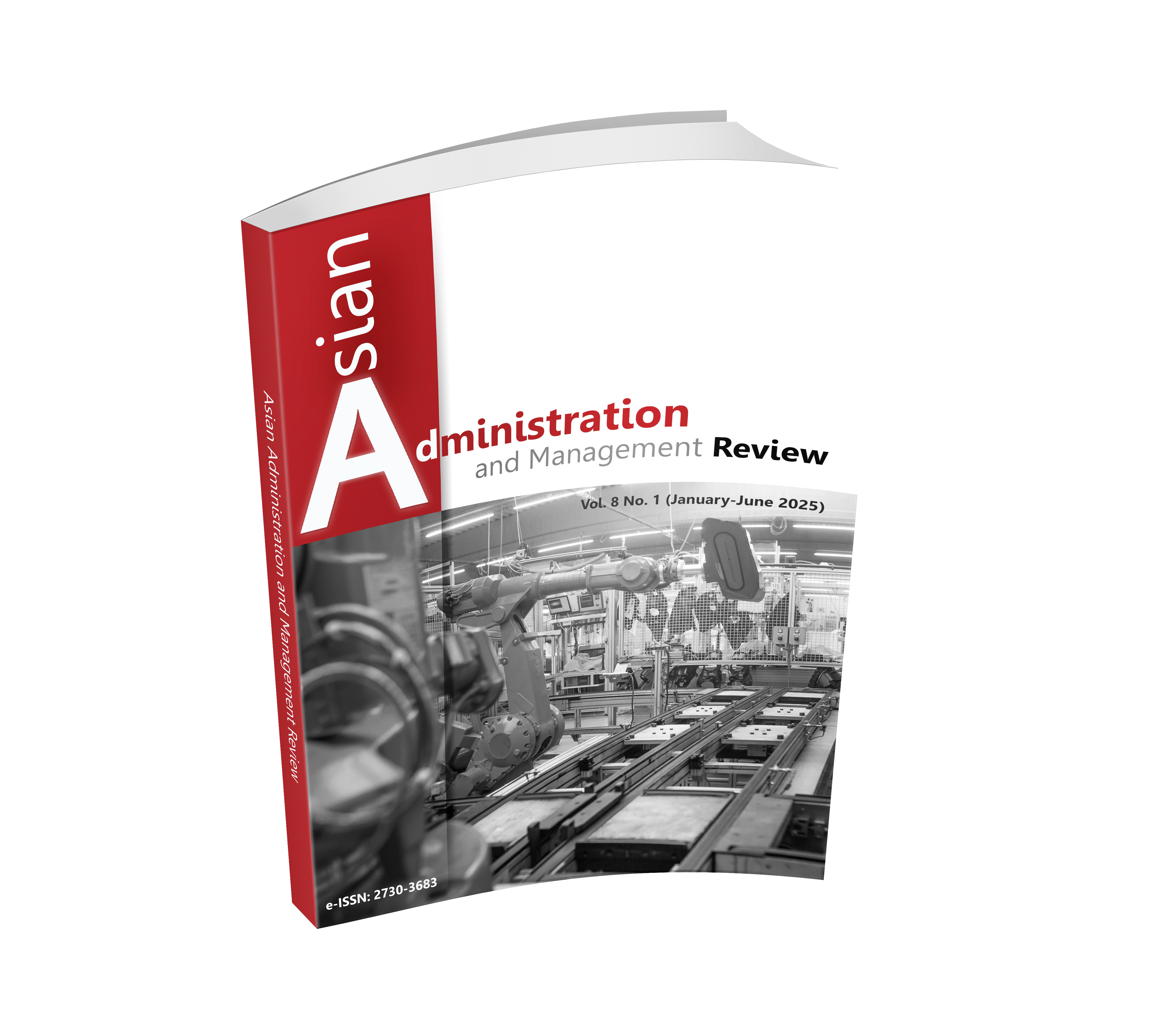PEOPLE'S PARTICIPATION IN DEVELOPING THE CAPITAL CITY OF LUANG PRABANG TOWARD A SMART CITY
DOI:
https://doi.org/10.14456/aamr.2025.2Keywords:
People's Participation, Smart City, PESTEL Analysis, Lao PDR.Abstract
The research aims to 1) investigate the people's knowledge and understanding of the development of Luang Prabang as a smart city and 2) investigate the external environmental factors that influence people's involvement in the transformation of Luang Prabang into a smart city. The study's sample group comprises 153 indigenous individuals from the Xiengthong, Wat That, Visoun, and Mano groups residing in the World Heritage Area. We utilized a questionnaire to gather data and statistics, including frequency, percentage, average value, and standard deviation. We then analyzed the survey data using multiple regression equations. The research findings revealed that the study examined the knowledge and understanding of Luang Prabang's development as a smart city among 293 residents of the World Heritage area. Overall, the level of knowledge about Luang Prabang's development as a smart city is high, accounting for 50.33%. This is followed by an intermediate level of knowledge-understanding at 28.10%, and a low level of knowledge-understanding at 21.57%. 2) The level of external environmental factors, with an average value of 3.95 and a standard deviation of 0.69, significantly influences participation in the development of Luang Prabang capital towards a smart city, with a mean value of 3.62 and a standard deviation of 0.88. Two external environmental factors, namely social and regulatory-legal factors, significantly influence people's participation in the development of Luang Prabang capital towards a Smart City, showing a positive correlation at a statistical significance level of 0.05. As for political factors, economic factors, technological factors, and natural environment factors, there is no effect on participation in the development of Luang Prabang capital to become a smart city at a statistical significance level of 0.05.
Downloads
References
Asian Development Bank. (2023). Luang Prabang Smart and Integrated Urban Strategy. Retrieved from https://events.development.asia/system/files/materials/2023/12/202312-luang-prabang-smart-and-integrated-urban-strategy_0.pdf.
Chansavang, V., Svetavong, S., Anolak, V., Vongvilai, X., Somsamon, V., & Mektanavan, V. (2021). Challenges, Feasibility and Approaches of Luang Prabang Smart City. Luang Phabang: Souphanouvong University.
Chittmittrapap, P., Kerdwichai, R., Suksod, P., & Chantararatmanee, D. (2022). The Driving Factors to the Success of Smart City Development in Phuket Province. Panyapiwat Journal, 14(1), 188-202.
Creighton, J. (1994). A Guide Book for Involving Citizens in Community Decision Making. Washington, D.C.: Program for Community Problem Solving.
Jenrangsan, S., & Saengkord, V. (2019). Development of Municipality to Smart City in Khon Kaen Province. Journal of Buddhist Education and Research, 5(2), 361-375.
Kaewtan, J. (2014). Factors Influencing the Acception of Electornic Payment Using Starphone Devices: In Case of Bangkok and Pathum Thani. Master of Accounting Thesis, Rajamangala University of Technology Thanyaburi.
Kittinaraporn, J. (2020). Factor Effecting on Smart City Case Study of Tha Khong Municipality. Journal of Communication Arts Review, 24(1), 71-81.
Klinhom, K. (2023). Factors Affecting Public Participation in the Progress towards a Smart City in Nakhon Si Thammarat City Municipality. Master of Public Administration Thesis, Prince of Songkla University.
Kokphon, O., & Kitiyodom, C. (2012). Politics and participation at the Local level Thai Local Government Encyclopedia, Section 5, Civil Society and Local Government, No.2 About politics and participation at the local level. Bangkok: Dhamma Press Company Limited.
Kruntkan, J. (2015). Factor affecting on taxation filing (e-filing): The usage of individual income tax payment system. Master of Accounting Thesis, Dhurakij Pundit University.
Ministry of Home Affairs of the Lao PDR. (2022). Civil Registration and Vital Statistics (CRVS) Project. Vientiane: Ministry of Home Affairs of the Lao PDR.
Nua-amnat, R., Brahmakappa, A., Pumturian, S., & Soonthondachar, J. (2021). The Development of Knowledge and Community Components of “Smart Community” for Community in Thai Society. Journal of Arts Management, 5(3), 559-573.
Prawanne, C. (2020). The Process of Transformation into a Smart City: A Case Study of Khon Kaen Municipality. Local Administration Journal, 13(3), 267-284.
Wongmanee, P. (2018). Smart City Development Guidelines: A Case Study of Pathum Thani Province. Master’s Thesis, Thammasat University.

Downloads
Published
How to Cite
Issue
Section
License
Copyright (c) 2025 Authors

This work is licensed under a Creative Commons Attribution-NonCommercial-NoDerivatives 4.0 International License.











.png)


